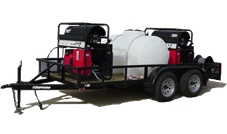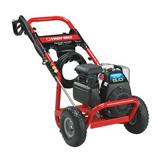 Pressure Washers Pressure Washers
When it comes to pressure washers there is
a tremendous range of types and power. You
don't have to use the very best equipment to
do a good job, but using quality equipment
is important. Even if you cannot start out
right away with a commercial grade unit, it
should be something you strive to obtain
as you grow your business.
Where to shop online?
Types of Pressure Washers
Electric vs. Gas Powered
I'll make this very simple. They make electric
pressure washers, but unless you are showing
up to clean the kitchen sink I would not
suggest asking, "where's an outlet". Electric
pressure washers are OK for some things,
but have little place in the commercial pressure
washing business. Go for gas powered!
Hot Water vs Cold Water
If your budget can swing it, consider a hot
water unit, but if it cannot, don't throw
in the towel. There's plenty of jobs that
simply do not require hot water. There's
many thriving businesses running just cold
water units, but hot water does have it's
advantages. Pressure washing isn't much different
than any other washing - hot water is generally
better, but cold water will work. Cold water
will do OK for most residential jobs, but
if you are considering commercial surfaces,
construction equipment or anything else particularly
greasy you will need hot water.
PSI = Pounds per Square Inch
The higher
the PSI the harder is shoots the water. 3,000
- 4,000 PSI is a respectable and plenty useful
PSI.
GPM = Gallons Per Minute
How much water can the pump dispense per minute.
In a nutshell, the more water you can dispense
per minute, the more ground (or surface)
you can cover in that same minute.
Chemical Injection Systems
Today, most any pressure washer unit you buy
will at least offer a "downstream" or "after
the pump" chemical injection system. Really
there's not much system at all as it's more
a function of your tip and creating a suction.
When using a "chemical tip" you actually
have very little pressure.
There's also "high
pressure" or "before the pump" chemical
injection which will generally be found on
higher end units. In this method, chemical
and water is run through the pump and sprayed
at high pressure. The irony to that is few
pressure washing experts recommend running
chemicals through your pump as this can damage
or shorten the life of your pump. Unless you
know lots about what you are doing and have
a pretty special reason for applying your chemicals
via the pre-pump injection method, most will
agree there are better methods.
 Portable, Skid Mounted or Trailer Rig? Portable, Skid Mounted or Trailer Rig?
There's no right or wrong answer here. To
many it's a matter of preference, to others
it's a matter of perception to your customers
and competitors. Portable units are typically
more affordable and can get into places
that bigger units sometimes cannot reach.
Portable units are not overly impressive
to your customers and seldom offer many
features.
Truck mounted units are great provided you
have a truck to dedicate completely to your
business. Truck mounted units allow you to
include other items like a large water tank,
chemical injectors, etc. The down side to a
truck mounted unit is the risk of the truck
breaking down and having to spend a week in
the shop. Large truck mounted units will require
a pretty substantial truck and between the
weight and hours of the pressure washer engine
running in its bed can put quite a burden on
your vehicle.
Trailer mounted units are my personal favorite
for the business. They can look impressive,
they are easy to customize and allow you to
use your truck bed for other items that you
most certainly will acquire. Should your truck
not be available you do have the option of
renting another truck and keeping busy. Pulling
a trailer is certainly less taxing on your
truck than carrying all that weight right in
the bed. A well thought out trailer rig will
also provide additional storage for things
like tools, hoses, wands, chemicals, etc.
Click here for some great places to shop for
pressure washers.
|